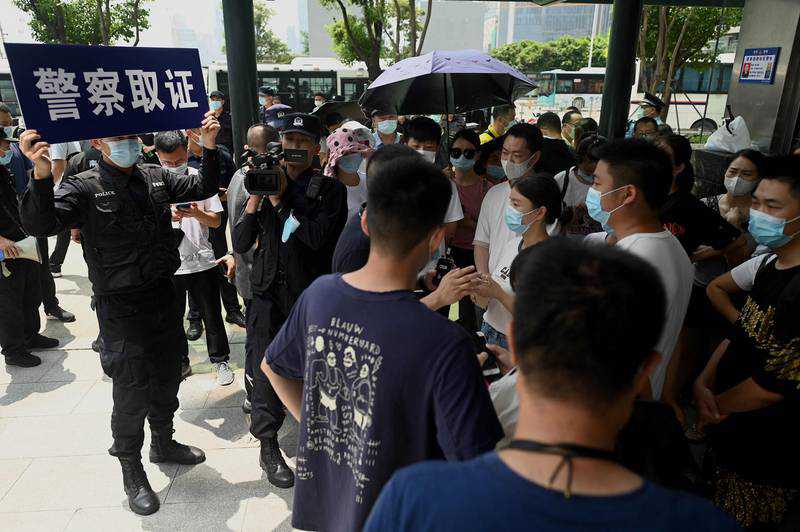Explainer: The Evergrande crisis and why its stock price is plunging
20 September, 2021

Evergrande Group, China's second biggest property developer by sales, has come under increasing scrutiny in recent months as the company grapples with a severe liquidity crisis due to a mounting debt pile.
Possible contagion from a default on Evergrande's obligations has rattled markets. With a staggering $300 billion in outstanding debt, the company's potential failure risks setting off a chain reaction in China and overseas markets. About 67 per cent of Evergrande's debt is cash that customers have paid towards property that has not been completed.
Protests by homebuyers and investors, demanding their money back and seeking answers from company executives, have broken out in recent days at Evergrande’s headquarters in Shenzhen and its offices across the country.
On Monday, the company's share price fell as much as 17 per cent with its market value plunging to a record low of $3.54bn. The company's stock price is down 85 per cent since the start of the year.
Here is a rundown on what Evergrande's troubles and potential default could mean for the property market in China and beyond.
What does Evergrande do?
Established in 1996, Evergrande is a Fortune Global 500 company and its main business is in property. Evergrande Real Estate owns more than 1,300 projects in 280 or more cities in China, serving about 12 million home owners, according to its website. Its property services arm, which was listed on the Hong Kong Exchanges in December 2020, has about 2,800 projects in more than 310 cities in China.
The group is involved in several other industries such as electric vehicles, healthcare, streaming media, TV and film production, foodstuff and mineral water, and life insurance.
The Hong Kong-listed company's shares and bonds are included in indexes all over Asia.
What is the extent of Evergrande's troubles?
The company faces a liquidity crunch and is among the world's most debt-ridden property developers. It borrowed extensively for years to expand and acquire assets during China's economic boom.
Last week, Evergrande provided a dire snapshot of its financial health.
"The company expects significant continuing decline in contract sales in September, thereby resulting in the continuous deterioration of cash collection by the group, which would in turn place tremendous pressure on the group’s cashflow and liquidity," it said in a bourse filing on September 14.
While September is usually a strong month for its property sales, the company expects a drop because of declining confidence of potential home buyers in the group, it said.
As part of plans to ease the crunch and improve its cash flow situation, the company is looking to sell assets. However, it has made "no material progress" on selling assets in Evergrande New Energy Vehicle Group, its EV unit, and Evergrande Property Services Group, it said at the time.
Evergrande has hired Houlihan Lokey and Admiralty Harbour Capital as joint financial advisers to assess its capital structure, evaluate the group's liquidity and "explore all feasible solutions".
The company is in desperate need to raise funds to pay lenders and suppliers. It has a bond interest payment of $669 million due this year, including $83.5m due on September 23 for a dollar note.
The company's share price is collapsing, trade in its bonds has been suspended and its credit rating has been cut in a series of downgrades due to an escalating risk of non-payment of debt.
How did the company reach the brink of default?
Market confidence in Evergrande began deteriorating in May, as it scrambled to raise cash to keep creditors at bay. The developer's financing difficulties stoked broader concerns about the outlook for the property sector.
Evergrande's liquidity problems have escalated in recent weeks after several of its subsidiaries failed to repay wealth management products, a major source of short-term funding for the company and other developers.
Who will be affected?
Banks, home buyers, investors, bondholders, suppliers and contractors are among those affected by the company's default risk.
Is Evergrande too big to fail?
Some analysts say that it is too big to fail and help will come from the Chinese government. Others argue a restructuring is more likely, with other developers taking over Evergrande's unfinished projects.
No global impact
Fears that Evergrande's woes will be felt more widely in the economy and markets abroad have been compared with the implosion of the US Lehman Brothers 13 years ago.
However, others see less risk of financial contagion.
"The ‘China’s Lehman moment’ narrative is wide off the mark," Simon MacAdam, senior global economist at Capital Economics, said in a report. "On its own, a managed default or even messy collapse of Evergrande would have little global impact beyond some market turbulence."
Source: www.thenationalnews.com
